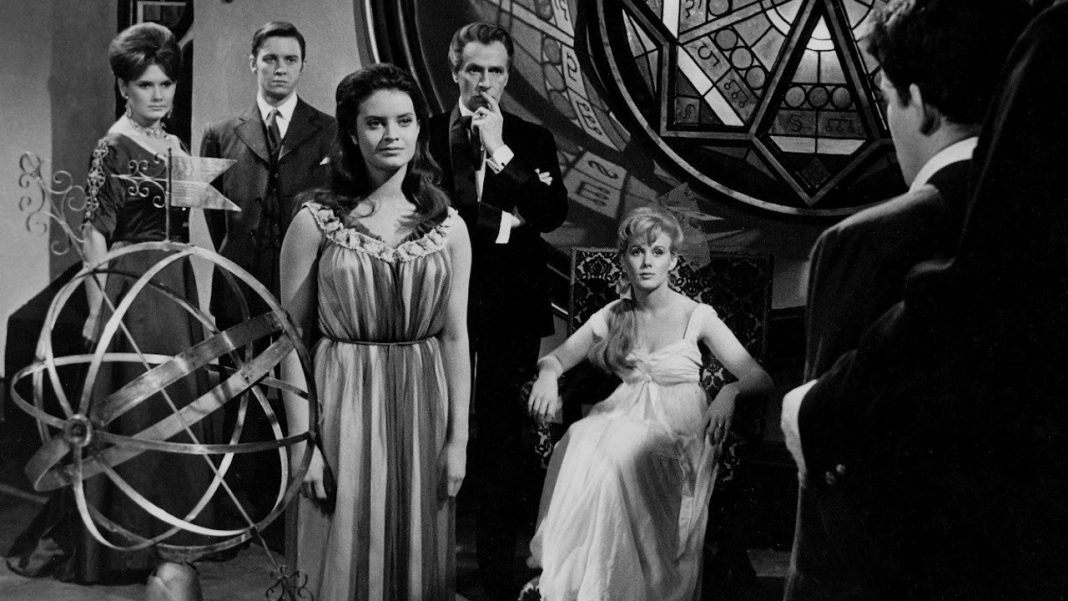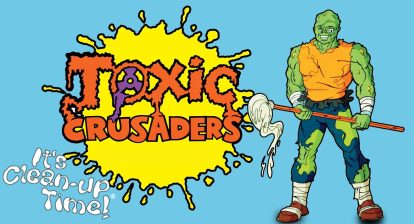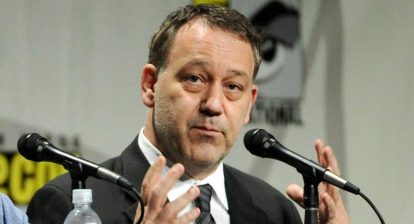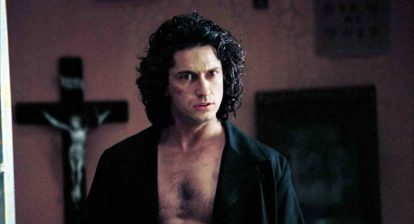Wicked Horror recently had the occasion to chat with Franck Khalfoun about his new film i-Lived, as well as about the upcoming Amityville sequel. The director filled us in on the character driven nature of i-Lived and he also opened up about why it has taken so long to get Amityville: The Reawakening into theaters.
Franck Khalfoun’s new film I-Lived features a video tech blogger named Josh Fosse. His life is going nowhere, he lacks a real job, and his girlfriend recently left him. In an attempt to improve his situation, he downloads a self help app called I-Lived. Through the app he meets the girl of his dreams, and is presented with a job offer he can’t refuse. When he deletes the app, he loses everything, but upon re-downloading it he finds that the tasks he must complete to reach his goals are outside his moral comfort zone. The program claims that the tasks are necessary to become a success, and he must decide between pursuing his dreams and doing what’s right.
Related: i-Lived is On Point and Thrilling [Review]

Franck Khalfoun: You know I kind of wanted a smart kid who did a bunch of college and watched his parents and the generation before him do well. He finds himself in a hole where he can’t get a job, he can’t pay student loans, he’s stuck and because of it everything is hard. That’s a character that I see every day, all the time. I thought he would relate to a lot of people in his generation and that it’s a good starting point for someone going into an adventure.
He’s actually someone who is looking to do something to better himself which goes into the concept of the film. Using technology to help yourself and make money at it like so many people are, or just to better your life on a daily basis. We use technology, and I think that was important to the character.
WH: Drawing on that since you did source from reality quite a bit, do you personally think we should be wary of our reliance on technology? That seems to be an underlying theme.
Franck Khalfoun: Oh absolutely. I’m not the guy who’s going to give answers “oh hey this is what we should do or shouldn’t do” and it’s not my job really. My job is to say “hey this is what I’m seeing and don’t you find it worrisome?” Wasn’t that in essence what Faust was all about? Be careful what you wish for and what you’re willing to give away for it. You see it, people almost get hit in the street because their faces are planted in phones. It’s that basic. You’re almost going to get run over by a car because of it, it doesn’t get any more basic than that. You’re not even looking where you’re walking anymore because you’re so connected to technology, and that’s just one aspect of it.
The other aspect is that I see many kids that don’t leave their houses anymore. They don’t have sports anymore, they don’t play music, they’re not involved in any sort of culture except what is related to technology. They all want to be programmers and make a fortune with apps and that’s all they really think about. How is human contact going to develop and how are children going to develop in the future? It’s really interesting, but certainly I don’t see it being a great thing. I feel so many wonderful things are lost because of it.
WH: Right, so we’re constantly in contact but not actually connecting.
Franck Khalfoun: You’re absolutely right. Everybody’s in touch, but nobody’s really dealing with everything. All of a sudden these images of us are out there but they’re not real. It’s like reality tv, it’s not real. As soon as you put a camera on somebody or put an image out there it’s not really you, it’s the image you want to portray yourself, and then you start to believe that it is your image and there you’ve lost yourself. It’s a really interesting development with what’s happening with people now.
It’s a thing I wanted to touch on. I mean obviously I wanted to make a movie that’s fun and entertaining, but you’re right on about that. That is what the commentary is about the movie. We’re selling ourselves. We sign ourselves off and we don’t know what we’re signing all the time. I find that hilarious. We’re so wary as a nation and as a people “don’t be taken advantage of” “be careful, be careful” and yet we click that button away so quickly without even reading two words.
 WH: You’re right. After watching the film I thought “Wow, we really do that” – Just sign away our first born child without even thinking about it. Just today, even, I had a software update and out of habit just clicked ‘Okay’ without a thought. I even had the thought afterward that I’m talking to you today about a film which addresses this issue and I didn’t even think twice.
WH: You’re right. After watching the film I thought “Wow, we really do that” – Just sign away our first born child without even thinking about it. Just today, even, I had a software update and out of habit just clicked ‘Okay’ without a thought. I even had the thought afterward that I’m talking to you today about a film which addresses this issue and I didn’t even think twice.
Franck Khalfoun: That’s funny, right? Me neither. I made the thing and I’m still doing it. I tell you though, I’ve asked across the board to every sort of occupation for years now “do you read those things, do you know what’s in them?” Nobody ever reads them except the lawyers. Every lawyer I talk to is like “I read it” but they’re the only ones who are used to it. It is written by them, so it’s familiar language but to us, we don’t care.
WH: It’s not as though we’d really understand what it was saying anyway in most cases.
Franck Khalfoun: Exactly.
WH: Overall, it’s a great movie. It’s scary, it’s disturbing, but it also makes you think. Those are the films that really resonate with you. I’m excited to see some more of what you have coming out. — Speaking of, I know you did the Maniac remake in 2012 and you’re working on the next film pertaining to the Amityville Horror house. Would you say that there’s more pressure for you when you’re working on a film project like that with an existing reputation and following or when you’re creating something completely original?
 Franck Khalfoun:I think they’re all filled with pressure. They’re equal in that regard. If I make a movie for the studio I’m still going to fight to make it somewhat original and give it a new, fresh perspective and take. I’ve never phoned it in. I’ve never made it just for the money. I’ve always accepted a project and proposed ideas which can elevate perhaps the genre, even and tell true, human stories through fear certainly, but also stories which can perhaps help people in a way. It’s kind of silly to think, “hey how can you help people with Maniac?” but there’s always some redeeming quality in the characters and in the film if they’re well made.
Franck Khalfoun:I think they’re all filled with pressure. They’re equal in that regard. If I make a movie for the studio I’m still going to fight to make it somewhat original and give it a new, fresh perspective and take. I’ve never phoned it in. I’ve never made it just for the money. I’ve always accepted a project and proposed ideas which can elevate perhaps the genre, even and tell true, human stories through fear certainly, but also stories which can perhaps help people in a way. It’s kind of silly to think, “hey how can you help people with Maniac?” but there’s always some redeeming quality in the characters and in the film if they’re well made.
It’s a challenge. The challenge is to always try to do something that’s a little more original that hasn’t been done and to try to connect to the audience. To today’s audience, to the new generation and the growing audiences, and to not take them for suckers and to try not only to entertain them but to give them something worth watching and to perhaps take home and think about. Like with I-Lived, it made you think about a few things. Hopefully you had fun doing it.
WH: Certainly. — With the recent influx of found footage films filled with jump scares, loud noises which turn out to be nothing when the monster’s really in the closet–horror fans feel those things are very much phoned in. I wanted to comment that I liked the way you utilized the different elements of found footage because he’s taking a video of himself, but you used it in a realistic way. It’s something that is important. I don’t necessarily think found footage as a tool is something that filmmakers should shy away from, but it’s all in how you use it. As someone who watches a lot of horror and thriller films I wanted to thank you for finding an innovative way to implement security footage and things like that.
Franck Khalfoun: I feel the same way about it and that is why I made those decisions. I knew that to make a low budget film, a little movie with my friends and unknown people, crew members and actors who are green and haven’t done it before but are very enthusiastic which is very exciting for me. The enthusiasm and making movies is what I relish and thrive on. To do that I had to figure out a way to use phones. I shot a lot of it with even my personal iPhone to shoot some of the movie and I thought that was important to be a part of that experience to use the phone in a way that the characters used the phone.
Since the Blair Witch there have been a thousand found footage movies and I didn’t want to do that. I started out wanting to do found footage because it’s a great way to do low budget movies. I always wanted to do one about Faust, a sort of Faustian film and when I did research on the Internet I found ways to figure out how to incorporate people’s real life footage. I made an appeal to Facebook to all my friends and some people I’ve never met sent me footage of them talking about the app. They created it and sent it to me, so it feels authentic when they’re giving me reviews on the app. I got a thrill out of that. They’re authentic movies from strangers across the world because we all do the same thing and it connects us for that reason.
I’m glad you saw that and appreciate the comment.
WH: I want to throw this in because I know our readers are curious. We talked a little bit about the Amityville project, and I know producer Jason Blum has indicated that tinkering is being done with the film in post-production. Could you elaborate any more on what you think or what Dimension has claimed caused them to pull it from the release schedule?
Franck Khalfoun: There are so many reasons. None of which, thank God, is because of the quality of the film; I can assure you. It’s a good movie, but the politics of putting a movie out and finding the right dates and finishing the movie during the right time and putting it out there. It’s more of a political thing than it is a constructional thing. I love the movie. I’m anxious to finish it correctly and to keep working on it. There has been time taken off of it for certain reasons here and there, but the movie itself was tested and tested wonderful. I’m proud of it, more importantly. I think it’s scary. Not only is it scary, but it’s closer to the tone of the original movie which is the same thing that I sort of did with Maniac. I created a new story, a new world for today’s generation and audiences but with the same sort of tone, seriousness, and fear so I’m very proud of the film and can’t wait for people to see it. Unfortunately Hollywood is full of very powerful people who have ulterior motives who decide different things. I’m a filmmaker, I’m a storyteller. Most of the time I leave the business and the politics to them. Unfortunately that’s the cost of making expensive movies. You’re tied to the decisions that they make, but I can assure everybody that it’s not because the movie didn’t work. It’s just other things out of my control, but it’ll come out. They’ve slated it for April, so I’m excited about that.
I-Lived will be released in theaters July 3, 2015 and will be out on VOD and iTunes July 7, 2015.






